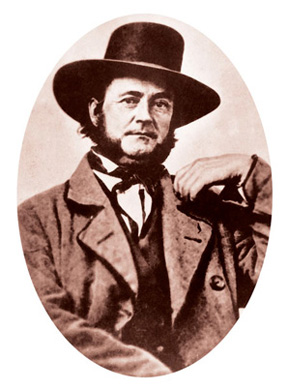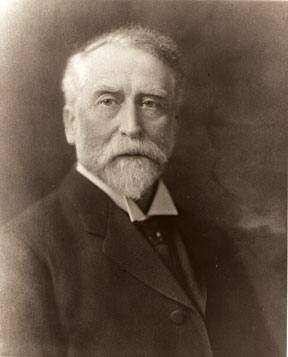Pioneer Courthouse
GALLERIES
Photos and images from the
walls of Pioneer Courthouse
 Joseph Lafayette Meek
Joseph Lafayette Meek
Legendary fur trapper Joseph Lafayette Meek was born in Washington County, Virginia, in 1810 and died in Washington County, Oregon, in 1875. Packed into those 65 years was an illustrious career as a trader and guide, pioneer, sheriff, Oregon’s first census taker and tax collector, provisional government legislator, and delegate to the nation’s capital to secure aid to fight the Cayuse Indians following the “Whitman Massacre.” Upon his arrival in Washington, D.C., and in his oft-grandiloquent fashion, he announced himself “Envoy Extraordinary and Minister Plenipotentiary from the Republic of Oregon to the Court of the United States.” While Meek was in Washington in 1848, and in response to his energetic lobbying efforts, Congress admitted Oregon to the union as a territory. He was appointed Oregon’s first United States Marshal by President James Polk, whose wife was Meek’s cousin, and the stand-up desk he used while holding this office remains in the courthouse. The former mountain man accompanied the new territorial governor, Joseph Lane, back to Oregon. Thrice married to Indian women, he retired in 1855 near Hillsboro, where he farmed for the remainder of his life. OrHi 3474

William Ball Gilbert
Born and raised in Virginia and the first Oregonian appointed to the Ninth Circuit, William Ball Gilbert was a descendant of the illustrious Colonel William Ball, who emigrated from England in 1650 and was the grandfather of George Washington’s mother, Mary Ball. The Gilbert family did not share the Confederate sympathies of other Virginia families and Gilbert’s father relocated to Ohio before the Civil War began. After graduating from Williams College in 1866, the younger Gilbert accompanied a scientific expedition to the Upper Amazon, then spent two years on a geological survey in Ohio. Leaving science behind him, Gilbert obtained his law degree from the University of Michigan and, in 1873, moved to Portland, Oregon, his home for the remainder of his life. Appointed in 1892 by President William Henry Harrison, Judge Gilbert was the ranking judge in the Ninth Circuit for nearly 35 years and his opinions were to span almost 300 volumes of the Federal Reporter (reports of federal appellate proceedings). Industrious and apparently possessed of great charm, Gilbert was very much a 19th-century man, though he lived more than a third of his life in the 20th century. He refused to ride in an automobile and his “passion for inconspicuousness” extended to never carrying a bundle on a streetcar, “fearing to attract attention.” Judge Gilbert’s opinions on many cases during his decades on the court contributed significantly to the development of Ninth Circuit law.
